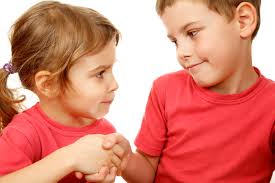
There’s this song that played on the radio this morning: Sorry Seems to Be the Hardest Word by Elton John. Uhg, I know this is an oldie-but-goodie type of song, but as it was reverberating in my head, it finally dawned on me that indeed, sorry seems to be the hardest word. For us adults, to take accountability when we do something wrong hurts our pride. Admit it, there’s a sense of shame that follows when we commit mistakes, much more when we admit that we are mistaken. But if it’s arduous for us adults, it can get even more complicated for kids to be remorseful.
Apologizing helps our child to accept responsibility for a wrong and provides a tool to make things right again. It helps our child dig himself out of a hole. It clears the air, helps heal the relationship, and gives it a new beginning. To teach our child — and yes, even ourselves — the art of apologizing, we can try the following tips:
1. Model apologizing
When you’ve acted wrongly, admit it. Apologize when you overreact: “I’m sorry I yelled at you. You didn’t deserve that outburst. I’ve had a hard day.” I’ve said this to my children many times. Everyone makes mistakes; that’s life. Everyone apologizes; that makes life better. These are valuable lessons for a child to learn. Saying “sorry” to your child is not a sign of weakness, but of strength. Even “the boss” should apologize if his or her actions are unkind. A child who has never been apologized to won’t understand the apology process, and more than likely he’ll refuse, turning a potentially beneficial moment into a standoff with hurt feelings.
2. Start young
Toddlers quickly learn to give a hug to “make it better” when they hurt someone. If you model hugs for hurts at home, he’ll know just what to do. Once he’s calm and ready to hug, you can verbalize a simple apology and maybe help him say it with a hug.
3. Forgiveness follows apologies
Apologizing and forgiving need to happen after someone gets hurt or offended. For most everyday squabbles we tell our kids that we want them to “make peace” with whomever they are at odds with. It doesn’t need to be a formal apology scene. We leave it up to them to figure out what “make peace” means and how to do it. Sometimes they use words, sometimes they don’t. But we all know if they have or haven’t. In order to live in the same house together, siblings need to be at peace with one another. Apology without forgiveness is an incomplete process. For real healing to happen the one offended needs to “drop the charges” by saying “that’s okay” or “I forgive you.”
4. Say “excuse me”
Children belch, gulp, and fart – excuse me, pass gas. Boys especially delight in showing off their body sounds. If one unintentional belch gets laughter, you can imagine what will follow. But if these sounds meet with silence or mild disapproval from you, they will soon fizzle away. Teach children that, in company, breathing sounds (that is sneezing and coughing) are okay but digestive tract sounds are rude. When your child emits upper digestive tract sounds in your presence, look disapprovingly, and say “excuse me.” Require the older child to excuse himself. Passing gas is especially offending because of the odor accompanying the sound. As your child gets older he will learn he can control this function most of the time and do it in private. If passing gas becomes a habit, the offender will quickly be taught by peer disgust to keep it to himself. As kids mature a bit their gut sounds diminish; these offenses will soon be sounds of the past.
5. Stop manipulating feelings and orchestrate sincerity
Some children learn to parrot an “excuse me” or “I’m sorry” within a millisecond of the offense to avoid being “squealed on” or to get themselves off the hook quickly if parents force apologies. Parents can’t force feelings. Only the child knows how he feels. Forcing feelings can teach your child to fake apologies, that it’s okay to be insincere, or that forgiveness has to be an instant thing which is not real life. Depending on the ages of the children, their temperaments, the circumstances, and the emotions that may be flaring, a cooling-off period before an apology will be needed. A two-year-old who just kicked his sister may need a two-minute time-out on a chair, along with a reminder that kicking hurts, before he’s ready to hug her. A ten-year-old who slaps her sister for vicious teasing must deal with wounded pride before she’ll be able to remember how wrong it is to slap. It’s your job as a parent to make sure the apology happens so both children can start again with good feelings between them. But, you cannot make it happen. What you can do is model and instruct: “When people are at peace with each other they feel better inside.”
As parents we want to teach our children empathy for others. It’s part of teaching them that they have an impact on their world and the people around them Thus, if we can take a little more time to teach our kids what “sorry” really means and how to show it, everyone might be a little happier in the end.
“MummySG, where every Mum is awesome.”






